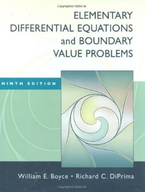Let x(1) , ... , x(m) be solutions of x = P(t)x on the interval < t < . Assume that P is
Chapter 7, Problem 8(choose chapter or problem)
Let x(1) , ... , x(m) be solutions of x = P(t)x on the interval < t < . Assume that P is continuous and let t0 be an arbitrary point in the given interval. Show that x(1) , ... , x(m) are linearly dependent for < t < if (and only if) x(1) (t0), ... , x(m) (t0) are linearly dependent. In other words x(1) , ... , x(m) are linearly dependent on the interval (, ) if they are linearly dependent at any point in it. Hint: There are constants c1, ... , cm such that c1x(1) (t0) ++ cmx(m) (t0) = 0. Let z(t) = c1x(1) (t) ++ cmx(m) (t), and use the uniqueness theorem to show that z(t) = 0 for each t in < t < .
Unfortunately, we don't have that question answered yet. But you can get it answered in just 5 hours by Logging in or Becoming a subscriber.
Becoming a subscriber
Or look for another answer
